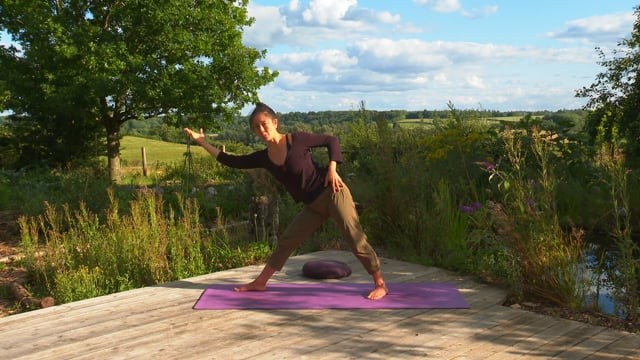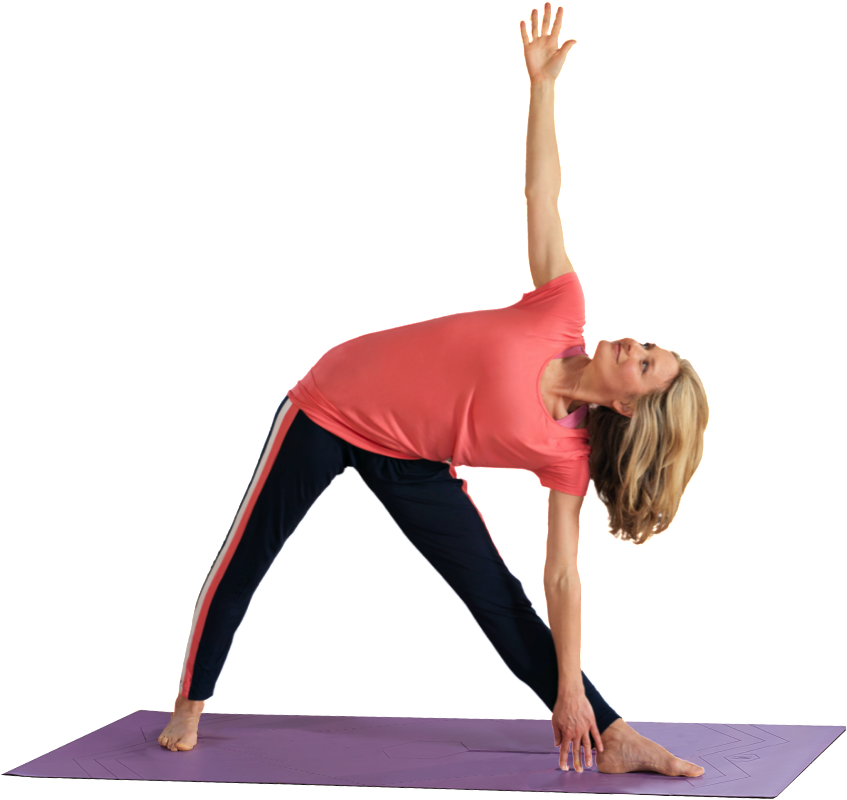Move into Happiness › Mimi Kuo-Deemer
-
 55:35
55:35Buddha's Teachings: Yoga for Equanimity
This gently flowing yoga and Qi Gong class explores the fourth of the brahmavihārās, or boundless states, known as upekkha, or equanimity. This fourth abode is often the most misunderstood, as equanimity can easily be written off as indifference and not caring. The Buddha’s teachings suggest this is far from the truth. His description of upekkha is that it is a perfect, unshakable balance of heart and mind, rooted in insight. When we cultivate equanimity, we cultivate a state of being even minded and calm. In this state, we learn to trust, meet and respond to life in ways that let us care deeply and fully about what truly matters. We make room for joy, pain, sorrow and challenges. We learn to meet life in ways that neither opposes nor demands more from it, and can remain steady, trusting and open to whatever grim corners we may turn in life.
-
 55:05
55:05Buddha's Teachings: Yoga for Sympathetic Joy
This yoga class focuses on the third aspect of the Buddha's teachings to awaken the heart, Mudita. Mudita means finding joy in the happiness and success of others. It is the third of four boundless states, or brahmavihārās. This well-rounded class has a particular focus on the hips and the hamstrings, two areas where many of us are tight due to either a sedantary lifestyle, or strengthening workouts. Being happy for others when they are happy are we are not, or they achieve things that we haven’t not the easiest practice. Indeed, ours is a world where comparison, judgement, envy and aggression are rife. Learning to be happy for someone when they are truly happy and shining usually requires a deliberate effort. When we can summon sympathetic joy, the rewards are magnificent and freeing. Through a cultivation of mudita, we can pull out the weeds of pettiness, envy and comparison. We become less selfish and self-centred, and grow into more tolerant, generous and compassionate individuals. Our actions can then create a chain-reaction, where a joyful and charitable heart ripples out into the world. You will just need a mat.
-
 01:02:04
01:02:04Buddha's Teachings: Yoga for Compassion
This yoga class focuses on cultivating a strong and resilient heart that awakens karuna, or compassion. It is the second of four boundless states, or brahmavihārās. Compassion means to be with another’s suffering. It is the opposite of cruelty. It can be conflated with pity, which it is not. Compassion is born out of a selfless desire to stand in solidarity with those who experience misfortune. Misfortune does not have to be starvation, physical pain and loss; it can be as simple as wanting something to be other than it is, which the Buddha described as creating clinging as well as a pushing away of experience. When we begin to cultivate compassion, we start with extending compassion towards ourselves. By forging self-compassion, we create a springboard for extending compassion towards others and all beings in the world. This well-rounded yoga class focuses on heart opening and brings in qigong movements.
-
 54:05
54:05Buddha's Teachings: Yoga for Loving Kindness
This is a practice centred around metta, which means goodwill, care, or loving-kindness. It is the first of four boundless states, known as the brahmavihārās. The brahmavihārās are the Buddha’s primary teachings on how we cultivate an awakened heart. In this yoga class, we’ll do some heart-focused practices and gentle movements (including some inspired by Qi Gong) to explore metta, which is the wish for true happiness that you can direct to yourself and towards others. In Buddhist teachings, metta is the foundations to our heart’s love and strength as it is what guided the Buddha along his path to care for a world that was in so much pain. As we learn to cultivate metta, we can learn to support our capacity to extend care to ourselves and the world, and send wishes for true happiness to all.
-
 24:13
24:13Qigong and Restorative Yoga: Finding Ease
Third in the series, Qigong and Restorative Yoga focuses on finding ease. This class opens the chest and shoulders. Often, ease eludes us because we feel tension, we feel stuck in our bodies. The qigong class starts with a qigong practice which fosters ease through tension release and heart-opening. We will then do some gentle restorative yoga practices to finish. You'll need a yoga bolster or sofa cushion, and a blanket for the restorative yoga.
-
 26:56
26:56Qigong and Restorative Yoga: Finding Balance
This is the second class in the three-part series, Qigong and Restorative Yoga. The first part of this class is a qigong elemental practice that will help balance the Chinese Five Elements of Wood, Fire, Earth, Metal and Water in your constitution. We will then do some quieting restorative practices to finish. You’ll want to have a yoga bolster or sofa cushion and a blanket.
-
 26:26
26:26Qigong and Restorative Yoga: Finding Harmony
Finding Harmony is the first of three classes in the series of Qigong and Restorative Yoga. It focuses on harmonising breath, body movement and the balance of yin and yang. It can be hard to find harmony in our lives of conflicting needs and priorities. Class starts with active qigong and then go on to a relaxing restorative yoga class. Ideally, have a yoga bolster and two blankets. Alternatively, you can also use a sofa cushion and two bed pillows.
-
 38:13
38:13Sort Yourself Out, Stretch Out and Start the Day
This mindfully-paced most-levels vinyasa class is great for sorting yourself out and stretching out to start your day at the beginning of the day. This class includes gentle stretches, sun saltutes, standing poses, hip openers, forward bends, a bit of everything to stretch out in the morning.
-
 01:09:19
01:09:19Energising Flow
Mimi weaves QiGong practices with a slow and steady flow. Join her in this smooth and meditative practice building to some gentle backbends. Guaranteed to leave you feeling balanced and refreshed.
Join the Wellbeing Revolution
This is your yoga, your way.
Build a happier, healthier, more sustainable life.
